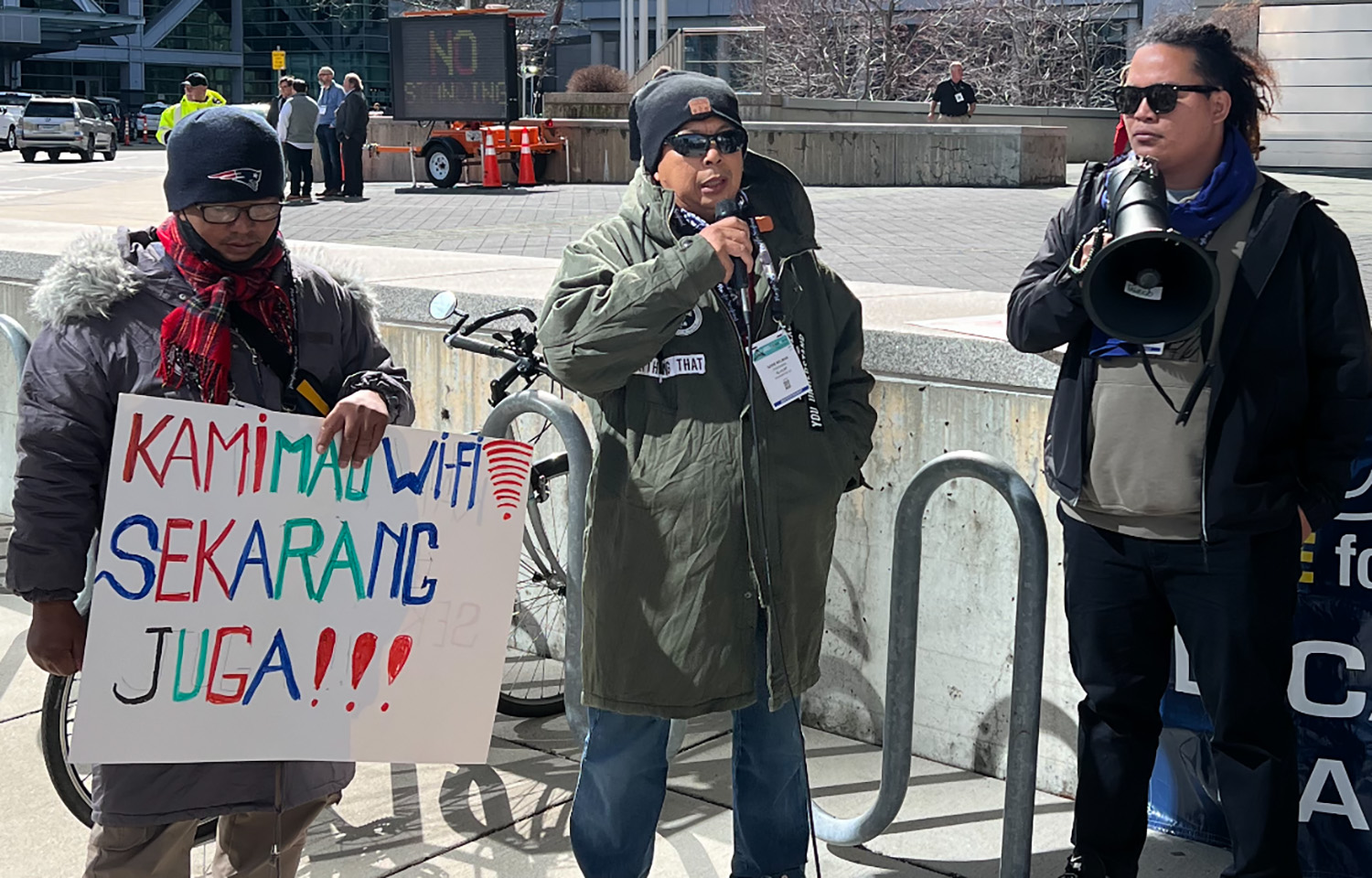Adrie Nelwan, an Indonesian fisherman, lost sight in his right eye in July 2021 when a fishing line snapped aboard the Taiwanese distant-water vessel was was working on.
Nelwan said if he had ready access to Wi-Fi after his injury, he believes he would have been able to get the medical coverage needed that would have saved his eye, as well as his career as a fisher.
At a protest calling for functioning Wi-Fi to be available to all crew onboard distant-water fishing vessels, Nelwan said the lack of support he received from his vessel captain, the Taiwanese and Indonesian governments, and the seafood industry at large, angered him enough to become a more vocal advocate.
He and other Indonesian fishers took part in a protest organized by the Global Labor Justice – International Labor Rights Forum (GLJ-ILRF) at the 2024 Seafood Expo North America on 11 March in Boston, Massachusetts, U.S.A.
“I am speaking here hoping that no more fishers have to experience an accident on the high seas, having to endure all the pain I did without any compensation [for my injury],” Nelwan said through the translating assistance of GLJ-ILRF Seafood Campaign Organizer Jonathan Parhusip. “If I would have had Wi-Fi, I could have reached out to a doctor earlier.”
This is the second year in a row the GLJ-ILRF – an NGO that works to advance policies that protect workers’ rights – has staged a protest outside of SENA calling for unlimited fisher access to Wi-Fi, which the forum believes is essential for multiple reasons in addition to situations like Nelwan’s, including giving fishers a way to report instances of illegal, unreported, and unregulated (IUU) fishing activities and improving the mental health of fishers who are at sea for several months at a time by giving them the opportunity to speak with their families.
“Through dialogue, we are trying to push for mandated Wi-Fi, which allows for labor rights to be exercised,” GLJ-ILRF Deputy Director Valery Alzaga told SeafoodSource “There is a lot of wealth being traded in [the expo] right now, which [juxtaposes with] the dire conditions workers in the industry like Adrie face as a business model.”
The onboard Wi-Fi movement has gained some momentum since last year, according to Alzaga, as evidenced by participation from several New England-based unions in this year’s protest, including a New England branch of the United Food and Commercial Workers Union and Boston Teachers Union President Jessica Tang.
Momentum has also come in the form of in-depth investigations on other labor abuses taking place across the seafood industry, such as an October 2023 Outlaw Ocean report that highlighted forced labor occurring onboard Chinese distant-water vessels and in Chinese processing facilities, forcing a swift reaction from retailers and seafood companies.
“I think the [Outlaw Ocean report] is raising awareness of the U.S. government and of a lot of organizations on how fishing works,” Alzaga said. “It’s painful to read about … Taiwan has abuse, too. It’s not, simply, that companies are bad; it’s the whole business model.”
With the global movement against labor abuse in the seafood industry gaining strength, the GLJ-ILRF is renewing its demand that the Taiwanese government codify labor rights for fishers like Nelwan in trade agreements.
“We are in dialogue with vessel owners and the fisheries agency of Taiwan to try to figure out how we can establish the best guidelines for Wi-Fi use,” Alzaga said. “[Taiwan] wants to improve, but the question is whether we are all pushing in the right direction.”
The group also wants companies participating at Seafood Expo North America to take a closer look at their supply chains to ensure no products stem from ships that perpetuate forced labor.
“We are trying to make companies here [at SENA] accountable to their own profits, which are made on the backs of fishers like Adrie,” Alzaga said. “We want dialogue, we want solutions, and we are not protesting for any old reason.”
SENA presents a unique opportunity to meet with company representatives face to face, Alzaga said, which Alzaga, Nelwan, and others made use of following the protest at a conference session hosted by the Seafood Task Force that featured representatives from Costco, Bumble Bee, Starkist, Thai Union, Walmart, and more.
After receiving questions from Nelwan and others about what participating companies specifically plan to do to ensure their supply chain is free from forced labor, Bumble Bee Vice President of Responsible Sourcing and Sustainability Traci Linder said her company has a rigorous exclusion list of vessels.
“It is our policy that if a vessel or processing facility that has environmental and labor crimes is in our supply chain that we cease business if it’s based on credible evidence,” Linder said. “We have an extensive exclusion list that includes many vessels, and many do not come off. We are not sitting on these things lightly.”
When pressed on the Wi-Fi issue in particular, Thai Union Chief Sustainability Officer Adam Brennan said his company was looking into the issue.
In the meantime, Nelwan plans to share his story as much as possible in the hopes no one has to experience what he did more than two years ago.
“I’m speaking here not just for myself; I’m speaking here for the fishers who are still facing what I experienced on my distant-water ship,” Nelwan said.








